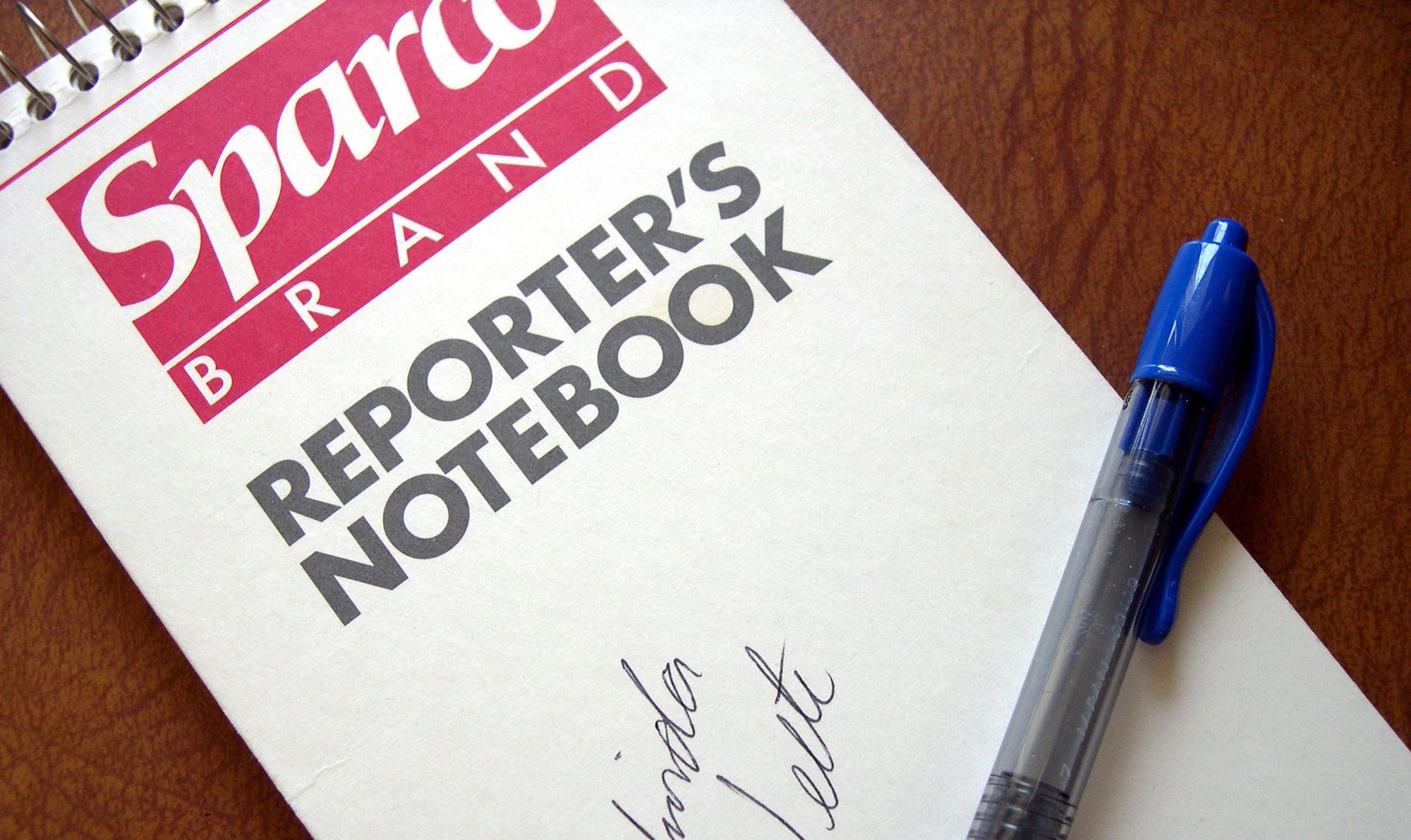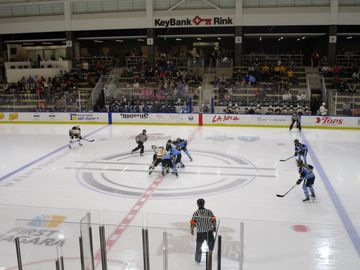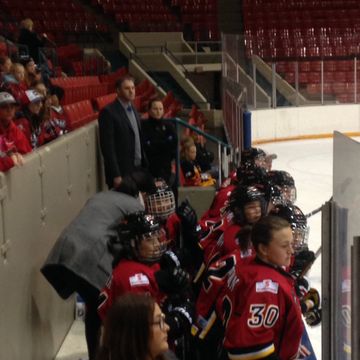On Friday, Harrison Browne, a forward in his second season with the NWHL's Buffalo Beauts, publicly announced that he's a transgender man. It was a historic moment for North American professional team sports, and a series of scheduled features, interviews, and posts went live throughout the day. In the future, I hope to write more about Browne the hockey player, but for the moment, I want to focus on how Browne's coming out was received and portrayed.
The way in which trans issues are covered in sports matters. When outlets like ESPN and Sportsnet cover trans sports stories, that coverage has an impact on actual trans lives. It was disappointing to see so many publications with a demonstrated record of transphobia and consistently ignoring trans issues trying to capitalize on the novelty of a trans sports story at the expense of a trans athlete. The personhood of trans athletes must be preserved in all sports writing. Harrison Browne deserved better.
One of the most prominent interviews about Browne's public announcement was conducted by Kate Cimini for VICE Sports. Her piece focused exclusively on Browne's gender, othering a professional athlete and diminishing his accomplishments as a player in favor of asking a series of questions about his coming out and his medical transition.
The VICE piece was written with cis folks in mind and for cis consumption, but that consumption extends beyond trans pain and trans narratives to trans bodies themselves. VICE and Cimini chose to include a question, without qualification, about whether Browne was currently taking T (testosterone) or whether he plans to take T in the future.
Many readers may have expected or even skimmed over this question, partially because we are used to expressing ownership over athletes' bodies. As fans, we often sexually objectify athletes and frequently demand knowledge of private medical information when a player is sidelined with an injury. But we are not owed this access. Their bodies do not belong to us.
Browne states that Chris Mosier's appearance and interview in the 2016 ESPN Body Issue helped inspired him to come out because Mosier spoke eloquently about authenticity, selfhood, and sport. However, Mosier's prior participation in the Body Issue does not grant a blanket permission to discuss Browne's body in such an invasive way.
Browne has been open about the fact that he is not taking testosterone, since using T would currently violate the NWHL anti-doping policy, and Cimini later said that she intended for her question to address that. However, the article as it initially appeared -- an article which may be many readers' first encounter with the words of an openly transgender man -- presented the question entirely out of context. Many readers who are completely unfamiliar with trans issues could have gotten the impression that this is an acceptable question to ask a trans person -- any trans person.
Cis writers who write about trans subjects are often ignorant of the relationships that trans folks have with their bodies. Some trans people feel content with their bodies as they are, others require social transition, and some need various medical procedures, including hormone therapy. All of these methods are valid. These choices are individual and personal; each trans person's relationship with their body is unique. Not every trans person experiences dysphoria in relation to their body, but some do.
To ask a trans person whom you don't know about whether they are undergoing hormone therapy is not just unacceptable; it can potentially trigger dysphoria and anxiety. But caring about a trans person's triggers requires sports writers to care about trans folks (and trans men like Browne) as people. It also requires an awareness from writers and editors that much of their readership is unfamiliar with or resistant to a trans person's story; it requires extra care.
Taking T isn't like getting a flu shot. For some trans men, it carries incredible emotional weight. T represents potential. T can be a way to overcome dysphoria. Self-injection provides a way to take ownership of your transition. It requires commitment, with weekly injections or regular transdermal applications. At the same time, T and the appropriate needles aren't always easy for trans men to obtain or to have prescribed.
If you know that it's inappropriate to ask trans people about whether they've had gender-affirming surgeries, you also need to know that it's inappropriate to ask them about hormone therapy. T is often the easiest and most affordable medical change that trans men can make, and many governments require some form of medical transition to legally change a person's gender. Asking about T is also a way to ask about a trans man's gender on legal documents, and therefore, potentially, ask about their own legal status.
Cimini's interview with Browne is also fixated on the coming-out narrative. Cimini asks Browne how long he's known he was trans, two questions about how he came out to various groups, another question about how the NWHL helped him prep for this moment, and finally a question about how Browne decided that the time was right to come out publicly. It's singularly focused on one aspect of trans existence -- coming out -- and doesn't shed much light on Browne as a person or athlete. Her problematic questioning also highlights why the interview takes this shape when she asks him: "Obviously, this is very much about you, but it's also about everybody else who might be looking in the Body Issue at you ten years from now. Looking forward, what do you hope to achieve by coming out as a trans man?"
Here, Browne the individual is sidelined, in favor of Browne the symbol of cis progress. This question illustrates what many cis allies believe: that trans athletes must be publicly out, must provide positive examples, and must be role models. Coming out is viewed as an action that is undertaken primarily for the benefit of others rather than an act a trans man undertakes for himself.
The coming out narrative is also valued because it allows cis folks to perform allyship and acceptance, as I wrote in August of the broader LGBTQIA experience:
This is why society values the coming-out narrative. For cishet folks, to be "closeted" is to live in shame, to live a lie, to be burdened by a painful secret. In this scenario, coming out allows cishet people to accept LGBTQIA folks, and thus alleviate our pain. By showing support for an athlete who comes out, fans, teams, officials, and leagues can demonstrate they are accepting without tackling the ways in which they are simultaneously discriminatory. By putting so much stock in notable coming-out stories, LGBTQIA media and ally organizations can market their interests without participating in the hard work of actual advocacy.
Throughout the day with various media outlets, Browne spoke openly about his relationship to his body and his transition plans. Frankly, it's great that he feels comfortable publicly speaking about his transition in such an open fashion. It's Browne's right to discuss his transition and his gender on his terms. What isn't okay is how this particular article approached a trans player as its subject, and how VICE made the editorial decision to publish these questions as if they were acceptable things to ask a trans person.
Other articles that covered Browne's announcement briefly mentioned his transition plans, in part to address the regulations that govern gender in existing leagues and organizations such as the NCAA and the IOC while the NWHL develops its own trans-inclusive policies (which should also be inclusive, accepting, and welcoming of trans women and nonbinary athletes). But Cimini's question about medical transition appeared all the more invasive because of its specificity.
What's more, while Browne is right to assert his masculinity and identity as a man (regardless of his medical transition status), when a cis writer emphasizes T, it implies that testosterone is the arbiter of masculinity; that a hormone determines who is, and who is not, truly a man. When one considers that major sporting bodies such as the NCAA and the IOC consider trans men ineligible to compete in women's competitions only after they begin hormone therapy, it seems like the sporting world agrees that T makes the man, but that simply isn't the case.
The choice to take T is a fully individual decision, and choosing not to does not make anyone less of a man. Suggesting that T is a necessary part of transition gives credence to the rigidly binary structure of our current athletics landscape.
In several of his interviews and in the YouTube video he released, Browne discussed how trans men who do not want to medically transition or who do not have access to T or medical procedures for a variety of reasons, are still men, and that their gender just as valid as any other man. His point is extremely important and is often lost on cis allies who assume that every trans person has the same end goal and that every transition looks the same. Many trans folks have articulated why it's inappropriate for cis people to ask invasive questions about our transitions, our bodies, and our genitals. Asking about T falls into this category and suggests that there is an essential male biology to which trans men must adhere, without exception or variation.
When T is emphasized in this way in pieces written primarily for cis readers, it helps foster a situation in which readers negate a trans man's gender and his eligibility to play in leagues such as the NWHL, based solely on whether he takes a specific hormone. (One need only look at the comments on the Puck Daddy piece for sample opinions that dissect and invalidate Browne's body.) It undermines the message Browne attempted to convey about the variety and diversity of trans men's appearances and transitions, and helps foster the kind of discrimination that organizations like the NWHL and You Can Play (YCP) are actively trying to discourage.
While emphasizing that there is some sort of essential male biology is damaging to trans people of any gender, reinforcing a limiting and singular understanding of masculinity is also problematic. On Friday, Sportsnet ran a feature on Browne written by hockey analyst Elliotte Friedman. Of all the pieces posted on Friday that announced Browne's gender, I thought Friedman's was the best. Browne's gender and transition were a part of the piece, but so was his hockey career. Browne was treated as a fully realized individual, with professional aspirations, conventional hockey experiences, familial relationships, and a gender revelation as one part of who he is. That's not to say I thought the piece was perfect. For instance, I don't think it was necessary to mention Browne's legal name, but Friedman's piece was far from the only one that included that information.
Friedman begins his piece with an anecdote about how Browne felt about representing Canada internationally for the first time at the World Under-18 Championships in 2011. It's a great introduction for the piece because it not only emphasizes Browne's athletic career, but also his competitive spirit.
The moment is presented as eminently relatable for hockey-playing Canadians, regardless of their gender; however, it's next to impossible for a man to wear the maple leaf and represent Canada on the international level without raising issues of masculine and national identity. However, I do think Sportsnet is a problematic network for a piece about a trans man who plays hockey because of the toxic masculinity that the network promotes as part of its hockey broadcasts -- broadcasts in which Friedman features prominently.
Canadian masculinity is defined by hockey in many contexts. Programs like Sportsnet's Hockey Night in Canada, with the bombastic Don Cherry, articulate the attributes of a narrowly defined and toxic version of masculinity. What Cherry conveys in his love for an old-school game and his military boosterism is a masculinity that is solely defined by physical strength and violence. It's also easy to pin this type of toxicity on Cherry, as he's both its most outspoken supporter in the game and the most convenient target for criticism.
Unfortunately, Cherry's message is communicated by more acceptable TV personalities in more palatable ways. Damien Cox, Glenn Healy, and P.J. Stock left HNIC this summer, but each contributed to a network culture of promoting physical violence (through minimizing the dangerous nature of fighting and hitting in hockey and by normalizing violence as "hockey plays"). Unfortunately, the current A-list of hockey hosts and analysts at Sportsnet -- men like Nick Kypreos, Ron MacLean, Kelly Hrudy, and yes, Elliotte Friedman -- have all at times minimized and normalized a culture of retributive justice in the game, while some have actively campaigned to maintain a status quo that permits fighting and violent, dangerous hits.
Players who are not willing to risk their body by blocking a shot or standing up for a teammate by dropping the gloves are derided for showing weakness and lacking loyalty, which are both sins in this type of masculinity. Players who are physically small are dismissed and are given little chance of success. Both explicitly and implicitly, mainstream hockey coverage in Canada associates masculinity and manhood with physical size and strength, as well as a willingness to use that physicality for violent ends.
It's a narrow presentation of masculinity and it leaves many wanting. Masculinity is not the sole possession of cis men; men, women, queer folks, and trans people can all stake a claim to masculinity. Masculinity is not a monolith, no matter how much hockey coverage in Canada tries to suggest that it is, and it is more accurate to speak of masculinities as a plural, which highlights the variety of presentation, behaviour, and beliefs associated with such diversity. Unfortunately, the toxic masculinity that men's hockey presents to us is similar to Cimini's question to Browne about testosterone use: it suggests that there are essential, biological traits inherent to men. In such an atmosphere, it is extremely difficult to acknowledge and recognize that trans men are indeed men.
On Friday, Browne, Dani Rylan, and YCP commented about how accepting hockey is. I am truly happy that Browne's experience in the game at both the college and pro level has been one of acceptance and inclusion. He deserves nothing less. But as a sport, hockey extends beyond the dressing room. Hockey has an entire culture around it, which includes those who play it recreationally and professionally; men, women, and nonbinary people; those who coach the game; those who cover it as journalists; and those who watch as fans. LGBTQIA folks contribute to this culture, too, and they must not be ignored.
Hockey culture is extremely transphobic at the moment. It is not enough to try and write sensitive and compassionate pieces about trans athletes when they come out. It is integral to consult with trans writers and editors on stories about trans athletes. Many of the problems in the media coverage of Browne could have been avoided if writers and editors had taken the time to consult with trans men.
It's also important to give trans writers opportunities to cover trans athletes, as well as to write about hockey more generally. If sports writers and publications are serious about making hockey a trans inclusive game, they need to actively overhaul the way the game is covered. This includes all forms of discrimination, such as racism, sexism, and homophobia. These are trans issues, too.
Conventional narratives that value and promote essential biological differences between men and women must end. Such conventions harm trans folks and celebrate a narrow and toxic masculinity that positions femininity (and women's sports) as inferior. It is not trans athletes and trans fans who must adapt to a cisnormative culture and a cis-dominated game. It is cis people who need to confront their overt and internalized transphobia, and who must actively work to make hockey and hockey coverage truly inclusive.







